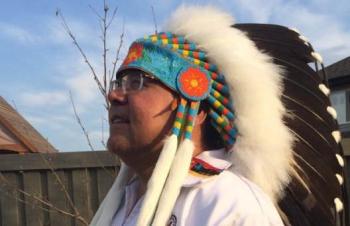Image Caption
Summary
Local Journalism Initiative Reporter
Windspeaker.com
Alberta chiefs are looking for a carve out for their nations in safe drinking water and wastewater legislation introduced in the House of Commons on Dec. 11.
“From our perspective, (legislation) has to adhere to treaty and I can’t see how treaty and legislation mesh,” said Tallcree First Nation Chief Rupert Meneen, spokesperson for the Chiefs Steering Committee on Technical Services Advisory Group (TSAG), which represents the 47 First Nations in treaties 6, 7, and 8 in Alberta.
One of the areas that TSAG specializes in is water and wastewater.
Indigenous Services Canada Minister Patty Hajdu would have known the treaty nations in Alberta had concerns, says Meneen, had the minister or members in her department replied to any of the phone calls placed by the chiefs steering committee prior to the tabling of Bill C-61 First Nations Clean Water Act.
“If you’re going to co-develop anything, we need to be part of it because we don’t belong to (the Assembly of First Nations),” he said.
“We want to speak for ourselves when it comes to these kinds of issues…We’re not being heard, like always, because we do come at everything from a treaty perspective and how that affects our treaties moving forward.”
In a news release, ISC says the proposed legislation was developed through “extensive engagement” that included First Nation rights-holders, including Modern Treaty and Self-Governing First Nations, through their own representative institutions, and organizations such as the Assembly of First Nations. Engagement leading to the bill began in 2018.
To move forward, Meneen is demanding that Canada establish a treaty table on water.
The proposed legislation is “full of presumptions,” says Norma Large, advisor to the chiefs steering committee.
“First, it presumes coordinated-style agreements,” she said.
The bill recognizes that water sources may be located adjacent to reserves in “protection zones” and assumes that all three levels of government have “agreed on an approach to coordinate the application of the First Nations laws… federal laws and the laws of that province…”
The bill also gives the minister jurisdiction, if requested by a First Nation, to “make regulations respecting the administration and enforcement of First Nations laws…in a protection zone…”
The minister is also the one to define a “protection zone,” according to the bill.
Meneen says First Nations already “have issues” with water licences, which are required to draw water even if a river is running through their community. In Alberta, like other provinces, the provincial government owns all water in the province, which is established under the Public Lands Act.
Now Meneen anticipates more issues with Alberta Premier Danielle Smith pulling out the Sovereignty Act or using litigation.
“If she invokes that Sovereignty Act, she’s just basically telling us, ‘I don't care about your treaties. I'll do whatever I want to do.’ And how do we deal with that?” he said. “The federal government is not helping us to deal with that…”
“Danielle Smith is opposed to everything,” said Large, noting Alberta’s stand on the carbon tax and other legislation.
Alberta was one of the provinces to legally challenge the carbon tax, but the Supreme Court of Canada ruled that the federal government had jurisdiction because it was a matter of national concern.
On Dec. 19, Smith, continuing on her theme of “constitutional intrusion into provincial jurisdiction” by the federal government, announced that Alberta would intervene in Canada’s appeal of the federal court ruling to argue that labelling all plastics as toxic was both unreasonable and unconstitutional.
Meneen is also concerned with what he views as the federal government downloading responsibilities onto First Nations and the lack of accompanying adequate funding. He points to the First Nations, Inuit and Métis children, youth and families Act, which gives jurisdiction to First Nations, but does not address funding. He anticipates the same will happen with the distinctions-based Indigenous health legislation the federal government is presently co-developing.
As for funding allocations for the safe water legislation, it states that “best efforts” are to be made by Canada.
Large points to the 2021 federal auditor general’s report on access to safe drinking water on First Nations. The auditor general found that Canada did not provide adequate support to ensure First Nations had ongoing access to safe drinking water.
Large notes an AFN assessment indicated $350 billion was required to address infrastructure needs, including water/wastewater issues. In Alberta, an assessment by TSAG has determined $50 billion is required to address infrastructure issues.
At this point, according to ISC, while there are no First Nations in Alberta with long-term boil water drinking advisories in place, there are eight First Nations communities with short-term drinking water advisories.
Large views the federal government’s safe water legislation as a “dump and run” technique.
“There's some nations that are jumping at (this legislation). They're taking it on, thinking, ‘I want to do this.’ But I want to do it, too. But I want to be funded,” said Meneen. “I don't want to take over an old broken-down car from the federal government to try to run this thing. We need to be funded equally. That’s my issue and that’s the problem with this legislation also.”
Large says the chiefs steering committee will continue to advocate, noting that a letter was sent to Hajdu earlier this week.
As the bill has only received first reading in the house, Large anticipates the legislation “will evolve” as it makes its way to third and final reading.
“We want clean water. We deserve clean water, but we shouldn’t have to do it this way,” she says.
The 2021 Safe Drinking Water for First Nations Class Action Settlement Agreement committed Canada to develop and introduce proposed legislation, in consultation with First Nations, to replace the repealed 2013 Safe Drinking Water for First Nations Act.
Local Journalism Initiative Reporters are supported by a financial contribution made by the Government of Canada.

